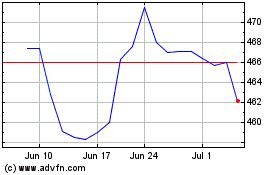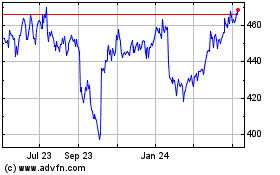ULA Drops Out of Pentagon Rocket Contest
November 16 2015 - 6:30PM
Dow Jones News
By Doug Cameron
The U.S. Air Force's first space-launch competition in a decade
threatens to turn into a dud, as the United Launch Alliance joint
venture that has dominated sensitive satellite work said it had
pulled out because it can't buy enough Russian-made engines.
The decision by ULA, a joint venture between Boeing Co. and
Lockheed Martin Corp., leaves Space Exploration Technologies Corp.
as the sole entrant when bids close Monday for the launch of a new
satellite for the Air Force-run GPS in 2016.
A final contract award is expected in March 2016, unless ULA
supporters in Congress manage to postpone a deal until there is
more than one bidder.
The GPS-3 satellite is the first of nine that the Pentagon has
selected for competitive bidding after relying on multiyear deals
with ULA to send sensitive military and intelligence equipment into
orbit.
The Pentagon started competitions this year in an effort to
lower average launch costs of more than $200 million for sensitive
missions. It was spurred by a lawsuit from SpaceX that aimed to
break ULA's long-standing monopoly on such deals, arguing that the
firm owned by entrepreneur Elon Musk was a cheaper option.
The suit was settled in January. In May, the Pentagon cleared
SpaceX to compete for its business, only to have one of the
company's Falcon 9 rockets explode during a launch in June.
SpaceX plans to return the rocket model to service in late
November or December.
ULA said in October that it wouldn't be able to compete for some
upcoming Pentagon launches unless the Defense Department granted a
waiver to circumvent Congress and buy more Russian-made RD-180
engines.
The Pentagon declined to grant an exemption, and lawmakers have
limited ULA's purchase of the Russian engines and want to phase out
their use completely by 2019, a response to Russia's actions in
Ukraine.
"I'm very disappointed that we're not able to participate," said
ULA Chief Executive Tory Bruno in an interview Monday.
Pentagon officials said in October that ULA could redirect
engines destined for nonmilitary use or wait for pending
congressional relief from the existing ban, which would allow it to
buy five more engines, enough to compete in the nine upcoming
launch contests.
Mr. Bruno said ULA's board hadn't signed off on acquiring
additional rocket engines because of the uncertainty over the
congressional ban, while ULA's existing motors had already been
modified for commercial customers.
Mr. Bruno said two other elements of the GPS contest made it
tough for the joint venture to compete. ULA was unable to separate
funding it receives from the Air Force to operate launch facilities
from its bid, as the contract requires.
The contract stipulated that the GPS deal be selected using a
Pentagon system called the "lowest price, technically acceptable"
bid, he said. SpaceX would undercut ULA on price, but ULA said its
unblemished record of successfully launching sensitive satellites
should be taken into account.
Separately, ULA and SpaceX are also pursuing Pentagon funding
for a U.S.-made rocket engine to replace the RD-180, with the
Defense Department expected to select two or more projects by the
end of the year. ULA is teamed with two of the entrants--
Amazon.com founder Jeff Bezos' Blue Origin LLC and Aerojet
Rocketdyne Holdings Inc., with Orbital ATK Inc. also offering its
own new rocket design.
Write to Doug Cameron at doug.cameron@wsj.com
Subscribe to WSJ: http://online.wsj.com?mod=djnwires
(END) Dow Jones Newswires
November 16, 2015 18:15 ET (23:15 GMT)
Copyright (c) 2015 Dow Jones & Company, Inc.
Lockheed Martin (NYSE:LMT)
Historical Stock Chart
From Mar 2024 to Apr 2024

Lockheed Martin (NYSE:LMT)
Historical Stock Chart
From Apr 2023 to Apr 2024
